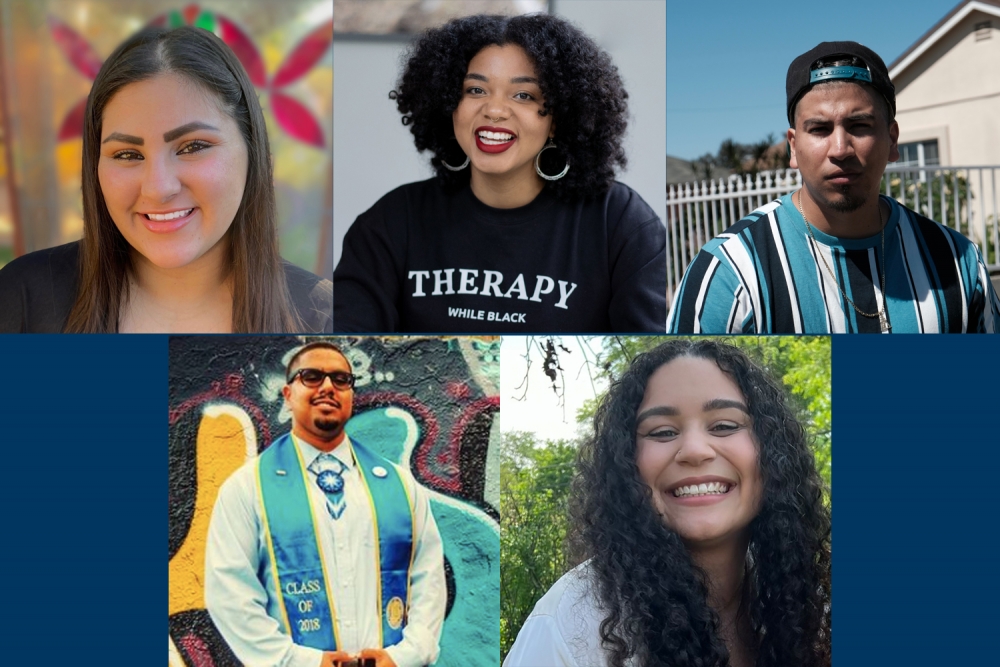
Freedom to Focus
Designed to enhance the recruitment of graduate students committed to teaching, research, and mentorship around racial justice, UC Santa Barbara’s Racial Justice Fellowship has begun in its second year, with a second impressive cohort of students.
Victoria Diaz (chemical engineering), Kaela Farrise (counseling, clinical, and school psychology), Humberto Flores (sociology), Nya Hayes (classics), Fabián Pavón (Chicana/o studies), and Kendall Rallins (feminist studies) are Graduate Division’s 2022 Racial Justice Fellows.
“This year’s Racial Justice Fellows bring experience in and commitment to a wide variety of projects,” said Interim Graduate Dean Leila J. Rupp. “We are especially pleased with the diversity of fields they represent, from chemical engineering to classics. In so many different ways, these students will join last year’s cohort in enhancing and conveying knowledge about racial justice and providing social support to students from underrepresented communities.”
Awardees say the fellowship funding provides not just motivation and support, but also the much-needed flexibility to pursue their research goals.
“This fellowship means that I have more time and freedom to focus on the reasons I decided to pursue a Ph.D. — to examine Black and Latinx mental health disparities through research and take more risks that can lead to better mental health outcomes,” said Farrise, a licensed mental health therapist with a background in clinical work who will pursue her doctorate in the Gevirtz Graduate School of Education. “It also indicated to me as a prospective student that studying issues of racial justice from a mental health perspective is meaningful to and supported by the university which was a huge driving factor for my decision to come to UC Santa Barbara.”
New fellow Rallins, a doctoral student in feminist studies, had a similar experience.
“Being awarded the Racial Justice Fellowship was just further confirmation that UC Santa Barbara was the place I needed to be,” Rallins said. “They showed me that they placed value in work like mine. To know that UCSB sees value in research that centers Black queer folks and wants to support my project and myself means everything.
The annual competition is open for nominations from all departments actively recruiting incoming students to graduate-level programs. “We continue to be amazed at the brilliant cohort of scholars that are awarded the Racial Justice Fellowship,” said Walter Boggan, Director of Admissions, Outreach, and Diversity Initiatives. “The continued support and commitment from the Graduate Division and the deans from across all of our disciplines will maintain our efforts in recruiting the best and the brightest graduate student scholars from diverse backgrounds.”
Launched last fall, the Racial Justice Fellowship Program is a collaboration supported by the Graduate Division and the deans of the Bren School; the College of Engineering; the Division of Humanities and Fine Arts; the Division of Social Sciences; the Division of Mathematical, Life, and Physical Science; and the Gevirtz Graduate School of Education.
Awardees receive an $8,000 summer stipend for the first three years of their program in addition to a five-year, fully-funded support offer.
“It is a privilege to be distinguished as someone deserving of such an award because there are many odds against me as a Mexican and Native American female wanting to obtain a higher education in STEM,” said Diaz, a Ph.D. student in chemical engineering who was a Sally Casanova Scholar during her undergraduate years at CSU Long Beach. “I want to connect with other students through the mutual goal of creating a more diverse STEM community, promoting what a diverse collective can bring to the table.”
A first-generation student, Humberto Flores completed his BA in sociology at UCLA and studied policing as a member of the Million Dollar Hoods project. The fellowship provides funding for Flores to travel from UC Santa Barbara to the Inland Empire each summer to pursue his graduate research as a doctoral student in sociology.
“The Racial Justice Fellowship reaffirms my research on police illegitimacy in minoritized communities,” he said. “Being a Chicano first-generation college student drives me to become a strong agent of diversity in the academy. Additionally, conducting policy-oriented research that has the potential to reimagine public safety keeps me motivated to finish the Ph.D. program. As a member of UCSB’s intellectual community, I am looking forward to working with the sociology department’s trailblazing faculty and learning from my colleagues in the program.”
Previous awardees were able to present their research to students, faculty and staff at the inaugural Racial Justice Symposium in May 2022, where the new cohort of fellows were among attendees.
“Their work demonstrates the intertwined relationship between intellectual merit and the broader impact, something that all researchers strive for in their research programs,” said Carlos Nash, director of graduate diversity programs. “I am excited for our second cohort and eager to learn how their research will positively contribute to the lives of many in our society.”



